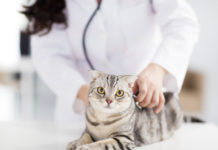Q. Dear Elizabeth: Our 11-year-old cat, Abby, is recovering nicely from a recent bout of cystitis. As part of her recovery, our veterinarian recommended that she be encouraged to take in more liquids. At his suggestion, we now place clean water bowls on every floor of our house — and Abby drinks from all of them throughout the day. The veterinarian also suggested that we add some chicken broth to her canned and dry food to make it more appealing. So I got into the habit of preparing a nice kettle of clear broth, which I then freeze in an ice cube tray.
Now, when Abby seems hungry, I thaw one of these cubes and mix the melted broth with her food. She apparently loves it. Unfortunately, preparing the broth, freezing it, and thawing it is quite labor-intensive and time consuming for me, and I’ve been thinking about using one of the commercially available broths from our local supermarket. The problem is that these broths contain garlic and onions, both of which I’ve heard are toxic to cats. How much garlic and onions would harm Abby? Could she tolerate just a little bit of this store-bought broth if it were extremely diluted?
A. I’m so pleased to hear that Abby is getting over her cystitis. From first-paw experience, I know how tormentingly painful this condition is, since I suffered a fleeting episode of it myself a few years back. For those cat owners who are unfamiliar with the condition, I’ll offer a brief description of it. Cystitis — sometimes referred to as Feline Lower Urinary Tract Disease (FLUTD) — is an inflammation of the urinary bladder that can have a number of causes including formation of crystals or stones (urolithiasis), matrix accumulation, neoplasia, urinary tract infection, feline idiopathic cystitis. In many cases it results from the formation of tiny mineral crystals that can eventually accumulate and become stones that irritate the inside of the bladder and, if large enough, may interfere with the passage of urine from an affected cat’s bladder. In any case, the urine may be bloody, and passing it is likely to cause significant discomfort. Indeed, a cat with urinary cystitis may howl in pain as it attempts to relieve itself.
Causes may vary, and while bacterial infection is not normally a common cause of feline cystitis, it is possible that the condition can be brought on by some sort of viral infection. And some veterinary researchers believe that stress might be a factor. But no one has been able to identify a single specific cause of this condition. Approaches to treating the disorder range widely. In some cases, antibacterial medications may be prescribed; in other cases, antianxiety meds may be suggested after other diagnostics are performed, such as urine analysis, radiographs, ultrasound and urine culture. In all cases, a veterinarian will urge the owner of an afflicted cat to encourage the increased consumption of water, the goal being the production of less-concentrated urine. And this brings us — somewhat circuitously — around to various issues that your letter raises. Here are my thoughts:
First, you’re certainly to be commended for promoting Abby’s access to her water bowls. This, no doubt, is speeding her recovery from cystitis. You might also experiment with one of those gurgling little water fountains that attract a cat’s attention and make water consumption a playfully engaging activity. Or you can simply turn on a faucet in your kitchen or bathroom sink and allow Abby to drink directly from it.
Second, I urge you to avoid using either onions or garlic — even in the smallest amounts — to spice-up Abby’s food. Both of these taste enhancers contain a substance called N-propyl disulphide, which destroy a feline’s red blood cells and can cause life-threatening anemia. Although onions are more dangerous than garlic in this regard, why not simply stay clear of both? I can think of several safe alternatives: Try drizzling the juice from a can of tuna, for example, over her food … or cranberry juice … or clam juice. (Incidentally, I should note that the labels on some bouillon products — whether liquid or in cubes — do not include onions or garlic on their lists of ingredients.)
Finally, confirm with your veterinarian that it’s okay for Abby to be eating dry food and, if so, the amount that she should be taking in each day. Dry food tends to be dehydrating — and that’s the last thing that a cat with this bladder disorder needs. Eating only canned food, with water added to it, is one of the factors that helped me eventually manage this disease. Love, Elizabeth



